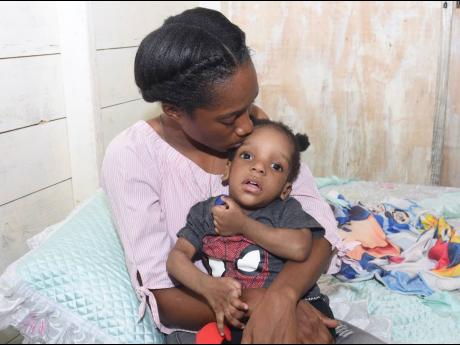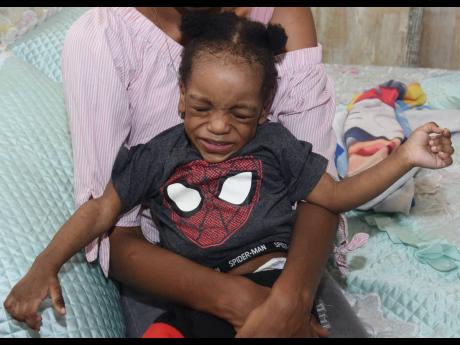Desperate single mother seeks help for baby diagnosed with cerebral palsy
WESTERN BUREAU:
“I am still so shocked. I was expecting a healthy child, and it is so devastating. I can’t even go to the supermarket without him being attended to.”
That is the emotional distress expressed by 24-year-old Desrine Malcolm, who is desperately seeking a better quality of life for her only child, one-year-old Joshua Cabana, who was diagnosed with cerebral palsy at birth.
Malcolm, a single mother who lives in Grange Hill, Westmoreland, and is currently unemployed, did her best to control her emotions as she explained to The Gleaner the challenges that come with caring for a child diagnosed with cerebral palsy, especially for a single mother. She said all this while playing with Joshua, who cracked a smile here and there despite not having full awareness of his surroundings.
“From him born I don’t sleep, 2020 until now I don’t sleep because he has to be attended to. One time, I fell asleep and when I woke up, he was suffocating because he woke before me. It was devastating because I found him half dead,” Malcolm recalled.
A LOVING MOTHER
Coming into this world with only one per cent heartbeat and being put on oxygen immediately, baby Joshua suffers from epileptic seizures and is unable to walk, speak or to be fed normally. Unable to digest any solid foods due to him having problems with his digestive system, he has to be fed liquids via a feeding tube attached to his stomach, a process known as enteral nutrition. Great care has to be taken to prevent him from contracting infections, as this is a very risky technique.
“He is on medication called ‘Keppra’ and it is actually very expensive. It costs $10,000 and it only lasts for one week,” Malcolm explained. “He can’t go a day without the Keppra, not one day. He has to get it every day.”
Keppra is used to treat epileptic seizures.
As she kissed him on his forehead and looked into his eyes while he struggled to stay still, the loving mother described the character traits of her son.
“He is playful and very energetic. He loves to watch only cartoons on TV and loves children. He is my pride and joy, and we share a bond because ever since he was born, he has been by my side, I didn’t leave him,” she expressed.
The hopeless mother, while sitting in her one-bedroom shack which she shares with her sick baby, outlined that at present she is only able to feed him Lasco drink mixes and apple juice.
The shack, located at the very back of her grandmother’s property, has very little furniture, aside from a small double-burner gas stove, which is used to warm the baby’s Lasco drink mix, and a bed to keep little Joshua comfortable.
Malcolm said that she has had to bear this problem without help from Joshua’s father, who she said disappeared when the baby’s sickness began to develop.
“Joshua’s father was there when he was a newborn but when he figured that the baby was sick, then he disappeared and it has been very rough as everything has gone downhill since then,” said Malcolm. It has been me alone, although my mother will step in to help.”
While the struggling mother has previously sought help for Joshua, the wait times given by the homes she contacted are too long for her to get the immediate help that he needs.
“I would like for my son to get into a home, not just because of the finances, but because I want to be able to work and maintain him and to live a normal life,” said Malcolm. “I have tried one home already, with two branches: one in Kingston and one in Montego Bay. The one in Montego Bay said they are not taking any more kids in 2022 only until 2024, but I cannot wait that long.”
According to the Cerebral Palsy Alliance Research Foundation, approximately 18 million people of all ages have cerebral palsy worldwide. Twenty per cent are tube-fed, 25 per cent are unable to talk and another 25 per cent have epilepsy.
Dr Paula Dawson, consultant physiatrist and rehabilitative medical specialist in the Faculty of Medicine Research and Teaching Complex at The University of the West Indies, said that the effects of cerebral palsy depend on the type and severity of brain injury suffered by the foetus in the womb.
“Children with cerebral palsy have problems with movement, and others will have other issues like seizures and the ability to understand, speak, hear or even see being affected. Depending on the extent of the brain injury at the time when the issue occurs, you may have different deficits, and cerebral palsy itself is secondary to the brain injury while the brain is developing, either while the child is in the uterus at the time of delivery or up to when they are up to three years old,” explained Dawson.
“The injury itself does not get worse, as it is a non-progressive brain injury, meaning the part of the brain that is injured does not get worse. However, sometimes it appears that the brain function gets worse, so if you have a brain injury and the brain is not telling the muscles to move, you cannot move,” she added.
For Malcolm, getting assistance with caring for Joshua would mean the world to her. “It would really appreciate getting nutritional foods for him to eat, diapers, Keppra medication that controls his seizures, a wheelchair so I can take him places with ease instead of lifting him and the bed mats. I have to look out for his future,” she said.
If you would like to help Desrine Malcolm and her son Joshua Cabana, you may contact her at 876-218-5918


